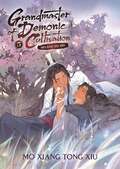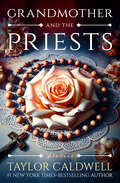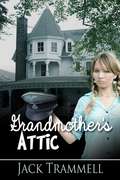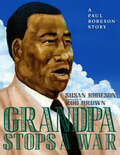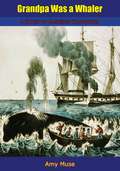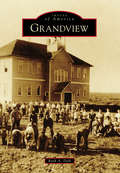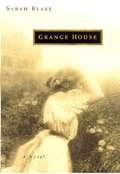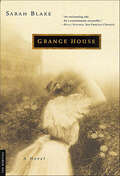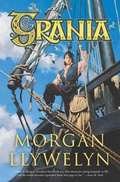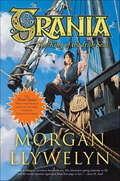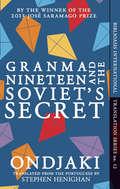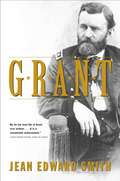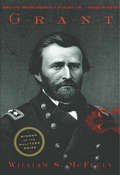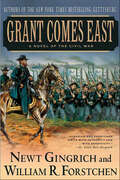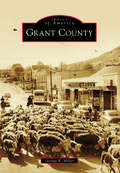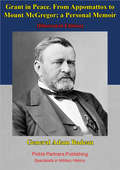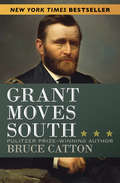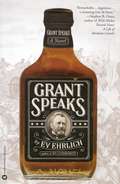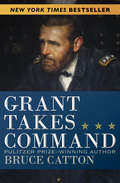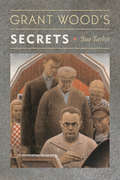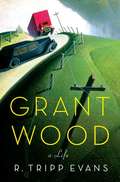- Table View
- List View
Grandmaster of Demonic Cultivation: Mo Dao Zu Shi (Novel) Volume 5
by Mo Xiang Mo Xiang Tong Xiu Marina Privalova Jin FangNEW YORK TIMES BEST SELLER! Also known as MDZS, the blockbuster danmei/Boys’ Love novels from China that inspired comics, animation, and the live-action series The Untamed! <p><p>In this final book (Volume 5), read the conclusion to this historical fantasy tale of two powerful men who find each other through life and death. Also includes bonus stories! <p><p>Wei Wuxian and Lan Wangji are headed for a showdown at Guanyin Temple, where their path converges with Jin Guangyao and Nie Mingjue's reassembled fierce corpse. With decades-long schemes finally unveiled, and terrible secrets unearthed, the events of this rain-battered night will decide not just the future of the entire cultivation world...but also that of a love story two lifetimes in the making. <p><p>Also included in this final volume are eight short stories about what happens when an epic tale ends but life goes on. From magical incense burners to tense banquets, lotus-pod-hunting to Night Hunts with the juniors—these stories span dawn to dusk and so much more!
Grandmother and the Priests: Stories
by Taylor CaldwellNew York Times Bestseller: In Victorian Britain, an affluent woman hosts a group of Catholic priests in her home—and listens as they tell their stories. Rose, a young girl visiting her grandmother, sits among eleven priests from Ireland, Scotland, and Wales. As each guest shares the most challenging moments of their vocations, tests of faith that have brought them face-to-face with the miseries, temptations, and evils that lurk beyond the peaceful confines of the rectory, their worldly, wealthy hostess and her granddaughter come to learn the struggles and outcomes of these confrontations with the human condition. &“The priests themselves represent a mixed lot—men of exalted backgrounds, culture, worldly experience, who have found their hardest task bringing themselves down to the humble people of their flocks; men who understand only the intellectual, realistic aspects of their faith—and must learn to accept the mystical as well; men who hide their saintliness under uncouth exteriors, who learn the hard way to love their fellow men, who encounter devils as well as saints, murderers, sinners. . . . Lively reading.&” —Kirkus Reviews
Grandmother's Attic
by Jack TrammellFourteen-year-old Angela Ziff finds an intriguing hat and letter in her grandmother's attic that opens the door to a family past that no one can imagine. Though her grandmother has passed away, the old house and the objects provide clues that Angela and her best friend Alan follow through a web of deceit and danger that ultimately reveals a shocking truth. Her grandmother had been helping hide a wanted Nazi war criminal. Angela finds a grandfather she never knew she had; encounters her real father, who threatens to repeat the family violence of the past; and tries to help her damaged mother navigate the new changes and accept them. Most of all, Angela finds that she must face some of the inexplicable unfairness of life just at the moment when she thinks she finally has some answers. Everything begins in her grandmother's attic.
Grandpa Stops a War: A Paul Robeson Story
by Susan Robeson"It takes a man of peace to stop a war." The true story of Paul Robeson's visit to the front lines of the Spanish Civil War is a tale of courage and activism told by his granddaughter, Susan Robeson. Grandpa Paul was a world-famous actor and singer with a deep and rumbling voice, a man of peace and principle who worried about the safety of children and families living in countries at war. He wanted to use his voice to promote social justice all over the world. Though people warned Grandpa Paul that it was too dangerous, he traveled with his friend Captain Fernando to the battlefields of the Spanish Civil War to sing to the soldiers. And then something amazing happened...With gorgeous illustrations from fine artist Rod Brown, Grandpa Stops a War celebrates Paul Robeson's global activism and towering achievements, and shows readers the power of music in times of discord and war.An author's note helps readers learn more about the author's personal experience growing up in the Robeson family, and gives parents, teachers, and librarians more in-depth material to expand the reader's understanding of the war and Robeson as a champion of civil rights, global freedom, and world peace.
Grandpa Was a Whaler: A Story of Carteret Chadwicks
by Amy MuseA survey of the Chadwick family of the Northeast and North Carolina, who played a pivotal role in the development of the regional commerce. The narrative focuses on the period from around 1725 and just after the Civil War.Researcher Amy Muse, a direct descendant of the Chadwicks on her mother’s side, first published Grandpa Was a Whaler in 1961. It became the first thorough research document on the earliest history of whaling in America in 1681 and the involvement of the Chadwick family over the years in whaling and ocean-going shipping. The narrative focuses on the period from around 1725 and just after the Civil War, from Massachusetts to North Carolina and, in particular, to Carteret County, North Carolina, where the Chadwicks established residency.
Grandpa's Third Drawer: Unlocking Holocaust Memories
by Judy Tal KopelmanOf all the places in the world, Uri really loves to be at his grandparents’ house. There he can stay up way past his bedtime and eat as many sweets from the chocolate box as he likes. There’s only one forbidden place in that house: the third drawer in Grandpa’s desk. This drawer is locked. No one ever opens it until one day when Uri finds the key to the third drawer. From that moment, nothing is ever the same.Grandpa’s Third Drawer takes up the difficult challenge of discussing the Holocaust with young children, of teaching its heritage and memory, all in a gentle and unobtrusive manner. The story of a silent grandfather unexpectedly confronted by his curious and loving grandchild is accompanied by rich illustrations that show authentic preserved objects donated by Holocaust survivors from Theresienstadt. The original Hebrew edition won the Israeli Ze’ev Prize for Children’s Literature in 2003 and won the first prize in Mits’ad Hasfarim (a nationwide survey of all schoolchildren in Israel for first to third grades) in 2003 and 2012. Grandpa’s Third Drawer is now included in Israel’s “Paths of Memory” nationwide Holocaust learning program in all schools.
Grandview
by Ruth A. DirkLocated midway between Yakima to the northwest and the Tri-Cities of Pasco, Kennewick, and Richland to the east, Grandview is central to the Northwest's large urban centers of Seattle, Portland, and Spokane. The townsite was chosen in 1905 as the final stop on the Sunnyside branch of the local rail line. Early farmers were met with blowing sand and jackrabbits, but with the addition of irrigation, lush fruit orchards and champion corn soon replaced native sagebrush. In 1910, one year after incorporation, 320 people called Grandview home. In the 1920s, dairies, poultry farms, and a winery marked a further transformation to the landscape. By 1940, the acreage given over to grape vineyards had greatly increased, asparagus was becoming a major crop, and more than 400 acres of hops were harvested. To this day, Grandview remains a small town where farming and related industries are major employers.
Grange House
by Sarah BlakeEvery summer Maisie Thomas has come with her parents to Grange House, a hotel on the coast of Maine overseen by the elegant and inscrutable Miss Grange who resides in the topmost story.The enormous house had always thrilled Maisie, appearing to her like something from old novels.But in the summer of 1896, the seventeen year-old Maisie has arrived restless and longing for her life's story to be different from those she has found between the covers of many books.As if in answer, the secrets of Grange House and its attic inhabitant begin to wrest free of their silence.On the morning after Maisie's arrival, two drowned lovers are found clasped in each other's arms.Then it seems Maisie finds herself in the lovers' shadow as two very different young men, one an adventurous writer, the other an ambitious businessman from her father's company, start to pay court.Will Maisie's story be but a love story after all?Maisie finds herself drawn more and more to Miss Grange, even as Miss Grange begins to tell Maisie strange and wild tales from Grange House's past, insisting that the girl is the only one who sill understand, and charging her with finishing one of her unfathomable tales.But which of Miss Grange's stories are truth and which are fiction?Another death, a hidden diary, mismarked grave, an exchange of letters - and a ghostly apparition - all lead Maisietoward the center of an old story that becomes her own, as she uncovers the secrets of Grance House.Rich with the details, customs, and language of the era, Grange House is part family saga, part ghost story, part love story: a wonderfully atmospheric, page-turning novel of literary suspense and romance.It is the tale of the many stories - familial and literary - in the house of fiction that women's lives must unlock and abandon in order to inhabit their own."So many writers now shout loudly, demanding our attention, but Sarah Blake quietly and skillfully lures not only our attention but our amazement at her ability to create and sustain a lasting visual and spiritual impression.Her words seem to have been as carefully chosen as a pearl, a perfect shell, or a ripe fruit.But with all its polished, wonderful narrative, there is a strong and amazingly durable undertow, a quiet driving force.Ms. Blake wrote this beguiling suspenseful novel the old fashioned way, with her head and her heart directing her along with equal measures." -- Kaye Gibbons"What an impressive novel Sarah Blake has written.With its vivid characters, suspenseful plot and elegant period details, GRANGE HOUSE is completely transporting.I couldn't stop turning the pages and was sorry to see them dwindle." -- Margot Livesey"A lovely book that provides a read both intriguing and delicious." -- Elizabeth Strout, author of the bestseller AMY AND ISABELLE"Sarah Blake's elegant novel is a rare achievement; Jamesian in its ambiguities, GRANGE HOUSE is marvelously untainted by postmodern ironic gestures or quaintness.What Maisie knew, and indeed, what Maisie discovers, makes this a true page-turner that belongs on the shelf between THE WOMAN IN WHITE and REBECCA." -- Katharine Weber
Grange House: A Novel
by Sarah BlakeFrom the author of the New York Times bestselling novels THE POSTMISTRESS and THE GUEST BOOK comes Sarah Blake's GRANGE HOUSE."Pleasing, intricate...[a] delightful book" —New York Times Book ReviewMaisie Thomas spends every summer at Grange House, a hotel on the coast of Maine ruled by the elegant Miss Grange. In 1896, when Maisie turns 17, her visit marks a turning point. On the morning after her arrival, local fishermen make a gruesome discovery: drowned lovers, found clasped in each other's arms. It's only the first in a series of events that casts a shadow over Maisie's summer. As she considers the attentions of two very different young men, Maisie also falls under the gaze of Miss Grange, who begins to tell her disturbing stories of her past.Rich with the details, customs, and language of the era, Sarah Blake's Grange House is a wonderfully atmospheric, page-turning novel of literary suspense and romance.
Grania
by Morgan LlywelynHistorical fiction about Grace O'Malley, an Irish chieftain in the late 1500's.
Grania: She-King of the Irish Seas
by Morgan LlywelynHere is an extraordinary novel about real-life Irish chieftain Grace O Malley. From Morgan Llywelyn, bestselling author of Lion of Ireland and the Irish Century novels, comes the story of a magnificent, sixteenth-century heroine whose spirit and passion are the spirit and passion of Ireland itself.Grania (Gaelic for Grace) is no ordinary female. And she lives in extraordinary times. For even as Grania rises as her clan's unofficial head and breadwinner and learns to love a man, she enters a lifelong struggle against the English forces of Queen Elizabeth -- her nemesis and alter ego.Elizabeth intends to destroy Grania's piracy and shipping empire--and so subjugate Ireland once and for all. But Grania, aided by Tigernan, her faithful (and secretly adoring) lieutenant, has no choice but to fight back. The story of her life is the story of Ireland's fight for solidarity and survival--but it's also the story of Grania's growing ability to love and be strong at the same time.Morgan Llywelyn has written a rich, historically accurate, and passionate novel of divided Ireland -- and of one brave woman who is Ireland herself.At the Publisher's request, this title is being sold without Digital Rights Management Software (DRM) applied.
Granma Nineteen and the Soviet's Secret
by OndjakiBY THE WINNER OF THE 2013 JOSÉ SARAMAGO PRIZEAN AFRICA39/UNESCO CITY OF LITERATURE 2014 TOP AFRICAN WRITER UNDER 40A GUARDIAN TOP FIVE AFRICAN WRITER, 2012WINNER OF THE GRINZANE PRIZE FOR BEST YOUNG WRITER, 2010By the beaches of Luanda, the Soviets are building a grand mausoleum in honour of the Comrade President. Granmas are whispering: houses, they say, will be dexploded, and everyone will have to leave. With the help of his friends Charlita and Pi (whom everyone calls 3.14), and with assistance from Dr. Rafael KnockKnock, the Comrade Gas Jockey, the amorous Gudafterov, crazy Sea Foam, and a ghost, our young hero must decide exactly how much trouble he's willing to face to keep his Granma safe in Bishop's Beach.Energetic and colourful, impish and playful, Granma Nineteen and the Soviet's Secret is a charming coming-of-age story from the next rising star in African literature.
Grano e non zizzania: Onore a un Maresciallo
by Guido Galeano VegaDescrizione del libro: In Grano e Non Zizzania si potrà vedere che, nonostante i progressi della scienza e della tecnologia, e nonostante tutte le esperienze riportate, l'umanità si sta muovendo verso la ripetizione di vecchi errori. Si potrà capire chiaramente che la maledizione del peccato, del male e della violenza è ancora insita nella genetica umana e, in un certo senso, le Sacre Scritture hanno di nuovo ragione. Il desiderio dello scrittore di Grano e Non Zizzania è di motivare a rafforzare i valori nobili nella vita della società umana, perché è una lotta di ciascuno, scegliere tra il bene e il male, non solo per ogni comune cittadino, ma anche per coloro che hanno la dura responsabilità della guida di nazioni, etnie e popoli. C'è una vecchia storia, in cui si racconta che viene chiesto ad un anziano il perché del bene e del male nelle persone. Il vecchio gli spiega che all'interno dell'essere umano ci sono due lupi, uno è un lupo buono e l'altro è un lupo cattivo, e sopravvive e diventa forte quello che viene nutrito, e muore quello che viene lasciato indifeso ed abbandonato. Se le nazioni continuano a fabbricare bombe nucleari ed investono milioni di dollari in materiale bellico, il lupo cattivo sta trionfando di nuovo nel mondo. Se ci lamentiamo del mondo in cui viviamo, non è perché il mondo sia cattivo, ma perché le persone non vogliono essere buone. Ognuno è responsabile per il miglioramento. La violenza non è una soluzione, è solo una scusa per coloro che servono e amano la violenza ed alimentano le loro priorità coi benefici che ne derivano. Siamo tutti chiamati da Dio ad essere grano e non zizzania. parole chiave: Alleanza, Grande Guerra, Triplice Alleanza, Guerra del Paraguay, Maresciallo Lopez, Grano, Zizzania, Difesa
Grant
by Jean Edward SmithUlysses S. Grant was the first four-star general in the history of the United States Army and the only president between Andrew Jackson and Woodrow Wilson to serve eight consecutive years in the White House. As general in chief, Grant revolutionized modern warfare. Rather than capture enemy territory or march on Southern cities, he concentrated on engaging and defeating the Confederate armies in the field, and he pursued that strategy relentlessly. As president, he brought stability to the country after years of war and upheaval. He tried to carry out the policies of Abraham Lincoln, the man he admired above all others, and to a considerable degree he succeeded. Yet today, Grant is remembered as a brilliant general but a failed president. In this comprehensive biography, Jean Edward Smith reconciles these conflicting assessments of Grant's life. He argues convincingly that Grant is greatly underrated as a president. Following the turmoil of Andrew Johnson's administration, Grant guided the nation through the post- Civil War era, overseeing Reconstruction of the South and enforcing the freedoms of new African-American citizens. His presidential accomplishments were as considerable as his military victories, says Smith, for the same strength of character that made him successful on the battlefield also characterized his years in the White House. Grant was the most unlikely of military heroes: a great soldier who disliked the army and longed for a civilian career. After graduating from West Point, he served with distinction in the Mexican War. Following the war he grew stale on frontier garrison postings, despaired for his absent wife and children, and began drinking heavily. He resigned from the army in 1854, failed at farming and other business endeavors, and was working as a clerk in the family leathergoods store when the Civil War began. Denied a place in the regular army, he was commissioned a colonel of volunteers and, as victory followed victory, moved steadily up the Union chain of command. Lincoln saw in Grant the general he had been looking for, and in the spring of 1864 the president brought him east to take command of all the Union armies. Smith dispels the myth that Grant was a brutal general who willingly sacrificed his soldiers, pointing out that Grant's casualty ratio was consistently lower than Lee's. At the end of the war, Grant's generous terms to the Confederates at Appomattox foreshadowed his generosity to the South as president. But, as Smith notes, Grant also had his weaknesses. He was too trusting of his friends, some of whom schemed to profit through their association with him. Though Grant himself always acted honorably, his presidential administration was rocked by scandals. "He was the steadfast center about and on which everything else turned," Philip Sheridan wrote, and others who served under Grant felt the same way. It was this aura of stability and integrity that allowed Grant as president to override a growing sectionalism and to navigate such national crises as the Panic of 1873 and the disputed Hayes-Tilden election of 1876. At the end of his life, dying of cancer, Grant composed his memoirs, which are still regarded by historians as perhaps the finest military memoirs ever written. They sold phenomenally well, and Grant the failed businessman left his widow a fortune in royalties from sales of the book. His funeral procession through the streets of Manhattan closed the city, and behind his pallbearers, who included both Confederate and Union generals, marched thousands of veterans from both sides of the war.
Grant
by William S. McfeelyIn this stunning biography, William McFeely brings us a thoroughly compelling story of a tangled life.<P><P> Having once said "a military life had no charms to me," U.S. Grant entered West Point to get through the course, secure a detail for a few years as assistant professor of mathematics at the Academy, and afterwards obtain a permanent position as professor at some respectable college. But the course his life took was quite different. Little did he ever dream that he would serve with distinction in the Mexican War, lead the Union to victory in the Civil War, struggle through eight years as President of the United States, and wage bitter personal battles against alcoholism, insolvency, and cancer.<P> Pulitzer Prize Winner
Grant Comes East: A Novel of the Civil War (The Gettysburg Trilogy #2)
by Newt Gingrich William R. ForstchenThe New York Times–bestselling authors of Gettysburg continue their “original, dramatic and historically plausible ‘what if?’ story” of the Civil War (Publishers Weekly).Confederate General Robert E. Lee knows that a frontal assault against Washington, D.C., could devastate his army. But it is a price that must be paid for final victory. Lee must also overcome the defiant stand of President Abraham Lincoln, who vows that regardless of the defeat at Gettysburg, his solemn pledge to preserve the Union will be honored. Lincoln will mobilize the garrison of Washington to hold on no matter the cost.Meanwhile, Lincoln has appointed General Ulysses S. Grant as commander of all Union forces. Fresh from his triumph at Vicksburg, Grant races east to confront Lee. What ensues is a titanic struggle as the surviving Union forces inside the fortifications of Washington fight to hang on, while Grant prepares his counterblow.The defeated Army of the Potomac, staggered by the debacle dealt at Gettysburg, is not yet completely out of the fight, and is slowly reorganizing. Its rogue commander, General Dan Sickles, is thirsting for revenge against Lee, the restoration of his army’s honor, and the fulfillment of his own ambitions, which reach all the way to the White House. All these factors will come together in a climatic struggle spanning the ground from Washington, through Baltimore, to the banks of the Susquehanna River.
Grant County (Images of America)
by George R. MillerThe large number of immigrants traveling along the Oregon Trail bypassed Grant County because of its location. Most wagon trains used the northern route to the Columbia River. A few used the southern route toward southern Oregon. Grant County was left in between. When gold was discovered in the Canyon Creek area in 1862, the population swelled from scarcely 200 to more than 5,000, many of them Chinese. Today, Grant County’s population is approximately 7,500, with John Day, the largest city, at slightly less than 2,000. From the 1860s to near 1900, gold and the mining industry reigned, as upward of $26 million worth of gold was mined. As the supply of gold diminished, so did the population, and timber became the number one industry. Settlers from the East saw potential in the large stands of tall, straight ponderosa pine, and many sawmills came into existence. The sawmills have since greatly declined, but other settlers discovered that the acres of bunchgrass provided excellent cattle feed. Today, cattle is king. In the spring, the cattle herds are moved off their winter grounds to higher elevations; in the fall, they are herded back into the valley. In the past, these movements often took them through the heart of many cities.
Grant In Peace. From Appomattox To Mount Mcgregor; A Personal Memoir
by General Adam BadeauFew men can have known General and President of the United States Ulysses S. Grant as well as General Adam Badeau. As Grant's military secretary during 1864-1865, he came to know and work closely with the future president; after the war he would go on to write a three volume history of Grant's military campaigns and serve as senior research assistant to Grant when the later was writing his memoirs. General Badeau came to recognize Grant's capabilities of healing a divided nation and was a frequent correspondent and eventually the President's confidant. General Badeau would go on to write of his friend's history in both his military and peacetime periods with great success. In this volume, Badeau charts Grant's political career and his manoeuvring that led to his appointment as President.
Grant Moves South: Grant Moves South And Grant Takes Command
by Bruce CattonA Pulitzer Prize-winning historian's acclaimed Civil War history of the complex man and controversial Union commander whose battlefield brilliance ensured the downfall of the Confederacy Preeminent Civil War historian Bruce Catton narrows his focus on commander Ulysses S. Grant, whose bold tactics and relentless dedication to the Union ultimately ensured a Northern victory in the nation's bloodiest conflict. While a succession of Union generals--from McClellan to Burnside to Hooker to Meade--were losing battles and sacrificing troops due to ego, egregious errors, and incompetence, an unassuming Federal Army commander was excelling in the Western theater of operations. Though unskilled in military power politics and disregarded by his peers, Colonel Grant, commander of the Twenty-First Illinois Volunteer Infantry, was proving to be an unstoppable force. He won victory after victory at Belmont, Fort Henry, and Fort Donelson, while brilliantly avoiding near-catastrophe and ultimately triumphing at Shiloh. And Grant's bold maneuvers at Vicksburg would cost the Confederacy its invaluable lifeline: the Mississippi River. But destiny and President Lincoln had even loftier plans for Grant, placing nothing less than the future of an entire nation in the capable hands of the North's most valuable military leader. Based in large part on military communiqués, personal eyewitness accounts, and Grant's own writings, Catton's extraordinary history offers readers an insightful look at arguably the most innovative Civil War battlefield strategist, unmatched by even the South's legendary Robert E. Lee.
Grant Park: A Novel
by Leonard Pitts"A novel as significant as it is engrossing. " --Booklist, starred review Grant Park is a page-turning and provocative look at black and white relations in contemporary America, blending the absurd and the poignant in a powerfully well-crafted narrative that showcases Pitts's gift for telling emotionally wrenching stories. Grant Park begins in 1968, with Martin Luther King's final days in Memphis. The story then moves to the eve of the 2008 election, and cuts between the two eras. Disillusioned columnist Malcolm Toussaint, fueled by yet another report of unarmed black men killed by police, hacks into his newspaper's server to post an incendiary column that had been rejected by his editors. Toussaint then disappears, and his longtime editor, Bob Carson, is summarily fired within hours of the column's publication. While a furious Carson tries to find Toussaint--while simultaneously dealing with the reappearance of a lost love from his days as a 60s activist--Toussaint is abducted by two white supremacists plotting to explode a bomb at Barack Obama's planned rally in Chicago’s Grant Park. Toussaint and Carson are forced to remember the choices they made as young men, when both their lives were changed profoundly by their work in the civil rights movement.
Grant Speaks
by Ev EhrlichWhether putting Generals Burnside, Hooker, and Robert E. Lee in their place, or listening to foul-mouthed General Sherman, Hiram Ulysses S. 'Useless' Grant offers an amusingly warped perspective on the Civil War.
Grant Takes Command: Grant Moves South And Grant Takes Command
by Bruce CattonA thrilling account of the final years of the War Between the States and the great general who led the Union to victory This conclusion of Pulitzer Prize-winning author Bruce Catton's acclaimed Civil War history of General Ulysses S. Grant begins in the summer of 1863. After Grant's bold and decisive triumph over the Confederate Army at Vicksburg--a victory that wrested control of the Mississippi River from Southern hands--President Abraham Lincoln promoted Grant to the head of the Army of the Potomac. The newly named general was virtually unknown to the nation and to the Union's military high command, but he proved himself in the brutal closing year and a half of the War Between the States. Grant's strategic brilliance and unshakeable tenacity crushed the Confederacy in the battles of the Overland Campaign in Virginia and the Siege of Petersburg. In the spring of 1865, Grant finally forced Robert E. Lee's surrender at Appomattox Court House, thus ending the bloodiest conflict on American soil. Although tragedy struck only days later when Lincoln--whom Grant called "incontestably the greatest man I have ever known"--was assassinated, Grant's military triumphs would ensure that the president's principles of unity and freedom would endure. In Grant Takes Command, Catton offers readers an in-depth portrait of an extraordinary warrior and unparalleled military strategist whose brilliant battlefield leadership saved an endangered Union.
Grant Wood's Secrets
by Sue TaylorIncorporating copious archival research and original close readings of American artist Grant Wood’s iconic as well as lesser-known works, Grant Wood’s Secrets reveals how his sometimes anguished psychology was shaped by his close relationship with his mother and how he channeled his lifelong oedipal guilt into his art. Presenting Wood’s abortive autobiography "Return from Bohemia" for the first time ever, Sue Taylor integrates the artist’s own recollections into interpretations of his art. As Wood dressed in overalls and boasted about his beloved Midwest, he consciously engaged in regionalist strategies, performing a farmer masquerade of sorts. In doing so, he also posed as conventionally masculine, hiding his homosexuality from his rural community. Thus, he came to experience himself as a double man. This book conveys the very real threats under which Wood lived and pays tribute to his resourceful responses, which were often duplicitous and have baffled art historians who typically take them at face value.
Grant Wood: A Life
by R. Tripp EvansA major new biography of America’s most acclaimed, and misunderstood, regionalist painter, Grant Wood who is revealed to have been anything but plain, or simple . . . R. Tripp Evans reveals the true complexity of the man and the image Wood so carefully constructed of himself. Grant Wood called himself a farmer-painter but farming held little interest for him. He appeared to be a self-taught painter with his scenes of farmlands, farm workers, and folklore but he was classically trained, a sophisticated artist who had studied the Old Masters and Flemish art as well as impressionism. He lived a bohemian life and painted in Paris and Munich in the 1920s, fleeing what H. L. Mencken referred to as “the booboisie” of small-town America. We see Wood as an artist haunted and inspired by the images of childhood; by the complex relationship with his father (stern, pious, the “manliest of men”); with his sister and his beloved mother (Wood shared his studio and sleeping quarters with his mother until her death at seventy-seven; he was forty-four). We see Wood’s homosexuality and how his studied masculinity was a ruse that shaped his work. Here is Wood’s life and work explored more deeply and insightfully than ever before. Drawing on letters, the artist’s unfinished autobiography, his sister’s writings, and many never-before-seen documents, Evans’s book is a dimensional portrait of a deeply complicated artist who became a “National Symbol. ” It is as well a portrait of the American art scene at a time when America’s Calvinistic spirit and provincialism saw Europe as decadent and artists were divided between red-blooded patriotic men and “hothouse aesthetes. ” Thomas Hart Benton said of Grant Wood: “When this new America looks back for landmarks to help gauge its forward footsteps, it will find a monument standing up in the midst of the wreckage . . . This monument will be made out of Grant Wood’s works. ”
Grant and His Generals
by Clarence Edward Noble MacartneyBased on 40 years of research on the Civil War, this book portrays little-known, but dramatic events incident to General Ulysses Grant's leadership of the Union armies.Grant’s Civil War career is a bright parenthesis in a long paragraph of failure. He failed as an officer in the old army; not indeed in the Mexican War itself, but thereafter, when he left the army under a cloud. He failed as a farmer; as a real-estate agent; in the opinion of many, as a President; and as a banker. But from Belmont to Appomattox, meeting and defeating one after another the ablest generals the South could pit against him, from Albert Sidney Johnston to Robert E. Lee, he enjoyed an unbroken record of victory and success.That success has puzzled many a student. How shall we account for it? Badeau, Grant’s military secretary, said that neither he nor the other members of the staff knew why Grant succeeded. They believed in him “because of his success.” Perhaps Sherman approached as nearly as anyone the secret; writing to Grant after he had been appointed lieutenant-general and commander of all the armies, he said: “The chief characteristic of your nature is the simple faith in success you have always manifested, which I can liken to nothing else than the faith a Christian has in his Saviour.”A great personality always embodies intangibles which elude classification and baffle definition. Undoubtedly, one of the best ways to study Grant and penetrate to the heart and mind of this in many ways inscrutable character is to regard him in the light of his personal and military association with the leading officers who labored with him.
